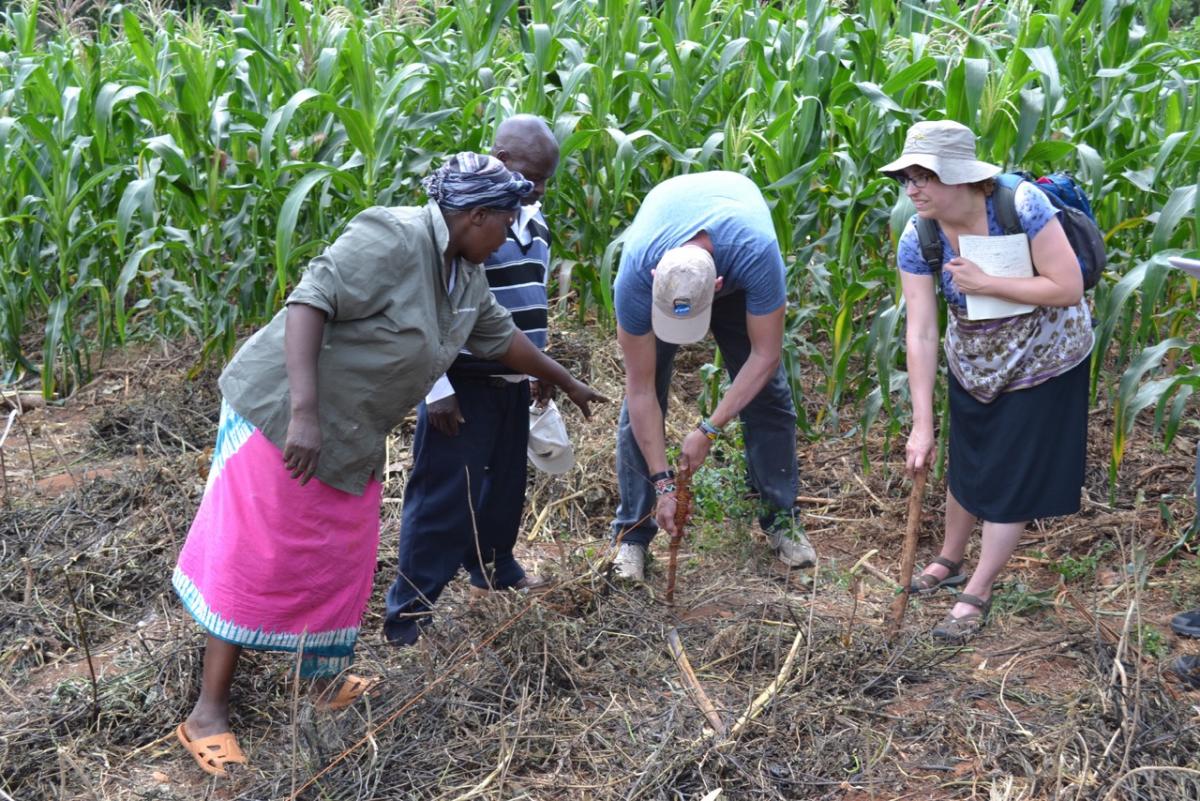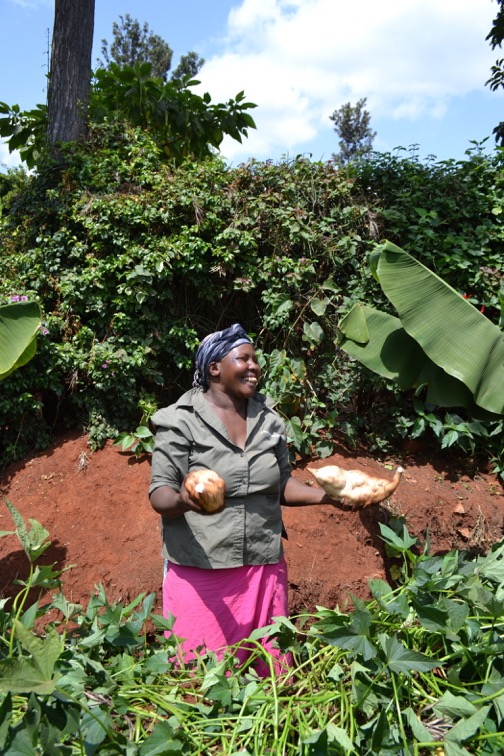When we visited the farm of Jane Manjiku in Kambiti village in Murang’a County, Kenya, she welcomed us warmly with the words “feel at home because we are together.” As a group of faith leaders traveling on a Learning Tour with Canadian Foodgrains Bank from July 10-24, 2016, we came representing different denominations and partner agencies, from different parts of Canada, but Jane’s inviting smile made it easy for us to feel at home together as she narrated inspiring stories about the changes on her farm.
As a group of faith leaders traveling on a Learning Tour with Canadian Foodgrains Bank from July 10-24, 2016, we came representing different denominations and partner agencies, from different parts of Canada, but Jane’s inviting smile made it easy for us to feel at home together as she narrated inspiring stories about the changes on her farm.
Jane mulches her field to help preserve moisture. Photo credit: Emily Cain
Jane received training in conservation agriculture through World Renew’s partner Anglican Development Services–Mount Kenya. On her half-acre farm, Jane uses many new techniques, including crop rotation, minimum tillage, and mulching her crops to preserve moisture. The thriving green maize plants taller than Jane’s head are proof of how effective that has been. Her neighbours said she must have been breaking her back to carry enough water to produce a crop so green and healthy, but when she told them she was not, they could hardly believe it. “I have gone far,” Jane notes, and she is eager to spread the word and help others do the same. Now that her neighbours see the results, they want to know more, and Jane is eager to tell them. The original group of 160 farmers who received the training through have gone on to train others, and now a total of 640 farmers have learned how conservation agriculture practices can improve their nutrition, increase yields, and enhance food security in the region.
It has not rained for a month, but you can see the difference in moisture between the soil on the left,
which was taken from under the areas where Jane has mulched, and the soil on the right. Photo credit: Emily Cain
The success of projects like this can be traced back to a web of partnerships—from the government level, to organizations like World Renew and ADS-Mt. Kenya, to field staff who deliver training programs, and the person-to-person relationships between local farmers.
As one of the member agencies for Canadian Foodgrains Bank, World Renew has a key role in the Good Soil campaign, which seeks to draw attention to the need to increase support for small-scale farmers in Canada’s international aid programs. As noted in the Good Soil materials, almost half the world’s farmers are women, but they receive only 5% of farmer education and improvement services worldwide. The effect of this training was immediate and obvious in Jane’s life.
Jane shows our group how to space out planting stations using string. This method disturbs the soil far less than using a hoe,
and is one of the techniques Jane has implemented after receiving training in conservation agriculture. Photo credit: Emily Cain
She noted that her family used to experience three hunger months per year, but now her farm not only produces enough to feed her family, but also a surplus that she is able to sell. With the money from those sales, Jane was able to open a small one-room “hotel,” where people come to buy food or rent space to sleep. She has plans to expand her farm by adding some cows and goats, and building a fence.
Jane’s generosity extends beyond her hospitality to a group of faith leaders from Canada and her role as a community leader, sharing the training she received with her neighbours; she also would not let World Renew Kenya Program Consultant Stephan Lutz leave without two of her beautiful sweet potatoes (freshly dug out of the ground!), and two of her chickens.
Jane with the two chickens that she also gave as a gift to World Renew Kenya staff member Stephan Lutz. Photo credit: Emily Cain
It has been nearly three months since I traveled to Kenya, but the memories that come back to me most often are the faces of Jane and the other farmers we visited, the warm hugs and handshakes, the smiles and generosity that were part of every visit we made. I wish I could tell Jane and so many others just how much they taught me in our short time together: how we are made to be in community, how we can share with others no matter how little we have for ourselves, how transformation happens not just from ideas but through relationships, how partnerships between the government and other agencies make possible this kind of dynamic growth and opportunity, and most of all how (as Jane said when we first came to her farm), the best things happen—and we all have the opportunity feel a little more at home, with enough food for everyone—because we are together.
Jane holding up two freshly-dug-up sweet potatoes that she gave as a gift to World Renew Kenya staff member Stephan Lutz. Photo credit: Emily Cain
If you are interested in learning more about how you can make a difference in the lives of farmers by encouraging the government to increase giving for international aid for agriculture, please see the Good Soil Campaign at the Foodgrains bank website: http://foodgrainsbank.ca/campaigns/good-soil/.
Photo top: Jane with her thriving maize crop. Credit: Emily Cain





